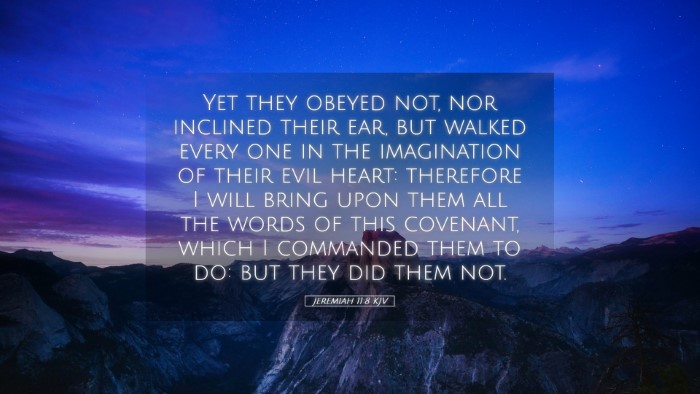Commentary on Jeremiah 11:8
Jeremiah 11:8 states: "Yet they obeyed not, nor inclined their ear, but walked every one in the imagination of their evil heart: therefore I will bring upon them all the words of this covenant, which I commanded them to do; but they did them not."
Context and Historical Background
This verse encapsulates the pervasive disobedience of the people of Judah in response to the covenant made by God. It comes in the context of Jeremiah's prophetic ministry, a time characterized by spiritual decay and a forsaking of divine commandments. The nation had repeatedly turned away from Yahweh, and this verse captures the essence of their rebellion against the covenantal relationship established with God.
Matthew Henry notes that the "imagination of their evil heart" reflects the inner corruption and moral deterioration of the people, emphasizing that their sin was not merely external but had deeply corrupted their thoughts and intentions.
The Nature of Disobedience
Albert Barnes expounds on the theme of disobedience, stating that the refusal to comply with God's commands results in dire consequences. The phrase "they obeyed not, nor inclined their ear" illustrates a willful neglect of God’s voice and instruction.
- There is a profound significance in the idea of "inclining the ear," which denotes an active listening and responsiveness to God’s words.
- Barnes emphasizes that rebellion against God's law leads to a hardened heart, evidencing a clear separation from divine guidance.
Consequences of Rebellion
God's response to their disobedience—bringing upon them "all the words of this covenant"—is striking. Adam Clarke suggests that this indicates the inevitability of divine judgment when the people refuse to uphold their side of the covenant.
Clarke further notes that the reference to the "covenant" emphasizes the seriousness of their transgression, as they were violating a solemn agreement. This covenant included blessings for obedience but also curses for disobedience, as articulated in Deuteronomy.
Theological Implications
This verse raises critical theological reflections on the nature of the covenant relationship between God and humanity. Matthew Henry reflects on God's justice and mercy; while He is patient and longsuffering, His justice will prevail when His people persist in rebellion.
Furthermore, the consequences of their actions highlight the principle of sowing and reaping, which is foundational in biblical teaching. Disobedience does not go unchecked; rather, it invites calamity and judgment.
Application for Today
In the contemporary context, this passage serves as a stern warning to believers and congregations regarding the importance of obedience to God's Word. Albert Barnes indicates that modern-day Christians should heed the lessons from ancient Judah, as spiritual complacency can lead to devastating results.
- The necessity of "inclining our ear" to God's instruction is paramount. Listening and responding to God’s call are critical for maintaining spiritual health.
- Engagement in daily scripture reading and prayer are practical ways to cultivate a heart that is receptive to divine truth.
- Furthermore, church leaders and students of theology are reminded of their responsibility to teach and model obedience to God’s commands, thereby guiding their communities in the ways of righteousness.
Conclusion
In conclusion, Jeremiah 11:8 serves as a profound reminder of the dangers of spiritual negligence and rebellion. Adam Clarke succinctly captures the essence of the seriousness of covenant fidelity, challenging readers to reflect on their own lives and the collective life of the Church.
The covenant established through Christ calls believers to a life of obedience—may we, therefore, choose to walk in alignment with God’s will, nurturing a heart that loves His commandments and desires to fulfill them.


